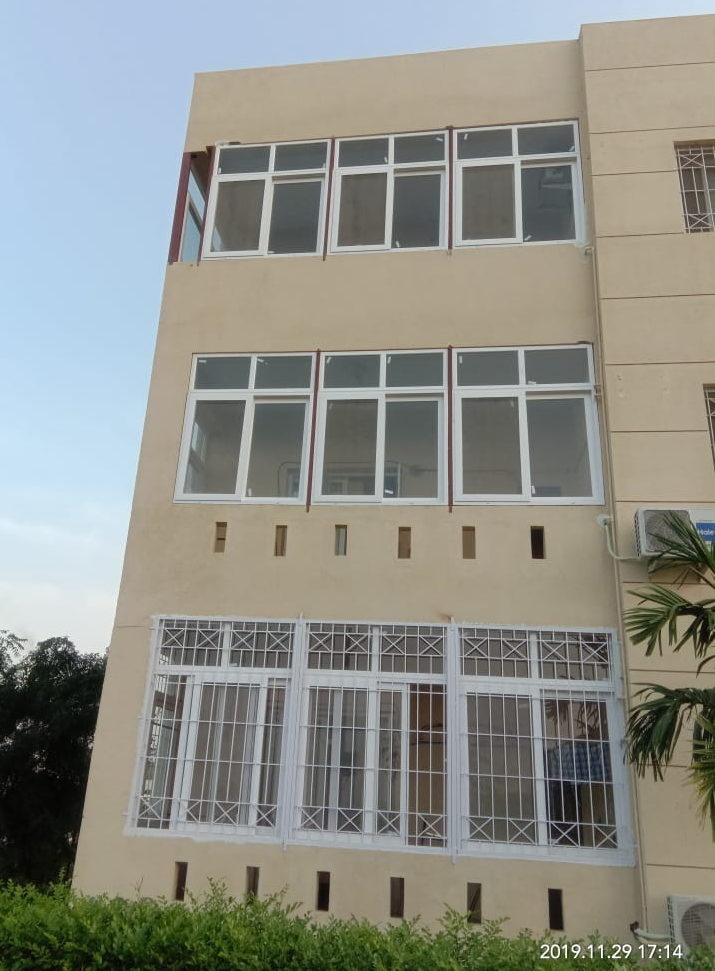#UPVC windows are designed to be highly weather-resistant and perform well in various weather conditions. They are suitable for both hot and cold climates. Here's how UPVC windows handle different weather conditions: 1. Hot climates: UPVC windows have excellent heat insulation properties, helping to keep the indoor temperature cooler in hot weather. They prevent heat transfer from outside, reducing the reliance on air conditioning and improving energy efficiency. 2. Cold climates: UPVC windows provide effective thermal insulation, minimizing heat loss and preventing cold drafts from entering the house. They help maintain a comfortable indoor temperature and reduce heating costs during winters. 3. Humid climates: UPVC windows are resistant to moisture and do not absorb water. They do not warp, rot, or corrode even in high humidity, making them ideal for humid climates. 4. Rainy climates: UPVC windows have good resistance to rain and water penetration. The tight seals and weatherproofing features prevent water leaks, ensuring the interior remains dry and protected. 5. Windy conditions: UPVC windows have sturdy frames and excellent structural integrity, making them suitable for areas prone to strong winds. They are designed to withstand high wind loads and maintain their performance even during storms or hurricanes. While UPVC windows are generally well-suited for various weather conditions, it's essential to consider specific regional factors and consult with professionals to ensure you choose the right type of UPVC windows that meet local weather requirements.
Chat with us on WhatsApp
×
This is your website preview.
Currently it only shows your basic business info. Start adding relevant business details such as description, images and products or services to gain your customers attention by using Boost 360 android app / iOS App / web portal.
#UPVC windows are designed to be highly weather...

2024-05-10T18:00:34
#UPVC windows are designed to be highly weather-resistant and perform well in various weather conditions. They are suitable for both hot and cold climates. Here's how UPVC windows handle different weather conditions: 1. Hot climates: UPVC windows have excellent heat insulation properties, helping to keep the indoor temperature cooler in hot weather. They prevent heat transfer from outside, reducing the reliance on air conditioning and improving energy efficiency. 2. Cold climates: UPVC windows provide effective thermal insulation, minimizing heat loss and preventing cold drafts from entering the house. They help maintain a comfortable indoor temperature and reduce heating costs during winters. 3. Humid climates: UPVC windows are resistant to moisture and do not absorb water. They do not warp, rot, or corrode even in high humidity, making them ideal for humid climates. 4. Rainy climates: UPVC windows have good resistance to rain and water penetration. The tight seals and weatherproofing features prevent water leaks, ensuring the interior remains dry and protected. 5. Windy conditions: UPVC windows have sturdy frames and excellent structural integrity, making them suitable for areas prone to strong winds. They are designed to withstand high wind loads and maintain their performance even during storms or hurricanes. While UPVC windows are generally well-suited for various weather conditions, it's essential to consider specific regional factors and consult with professionals to ensure you choose the right type of UPVC windows that meet local weather requirements.
2024-05-10T18:00:34
Keywords
- areas
- house
- storms
- outside
- winters
- interior
- moisture
- reliance
- heat loss
- right type
- hurricanes
- cold drafts
- tight seals
- hot weather
- performance
- water leaks
- UPVC windows
- Hot climates
- strong winds
- professionals
- high humidity
- cold climates
- heat transfer
- heating costs
- sturdy frames
- Humid climates
- Rainy climates
- good resistance
- high wind loads
- air conditioning
- Windy conditions
- energy efficiency
- water penetration
- weatherproofing features
- specific regional factors
- various weather conditions
- local weather requirements
- different weather conditions
- effective thermal insulation
- comfortable indoor temperature
- excellent structural integrity
- excellent heat insulation properties

Submit Your Enquiry